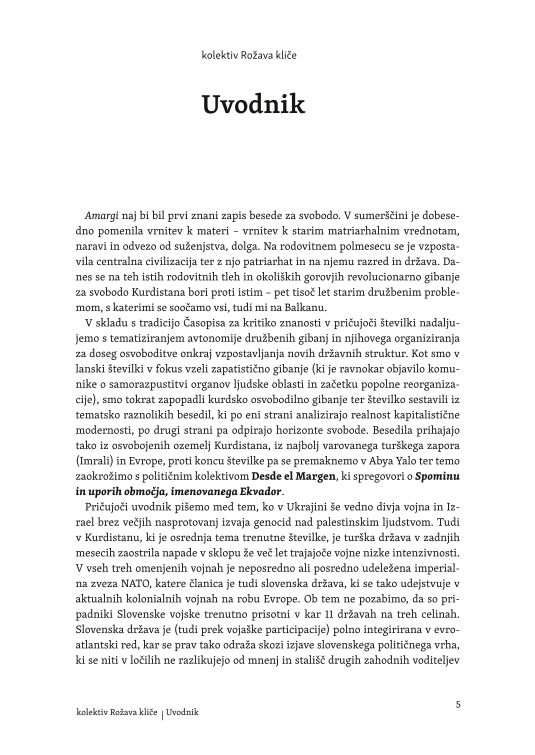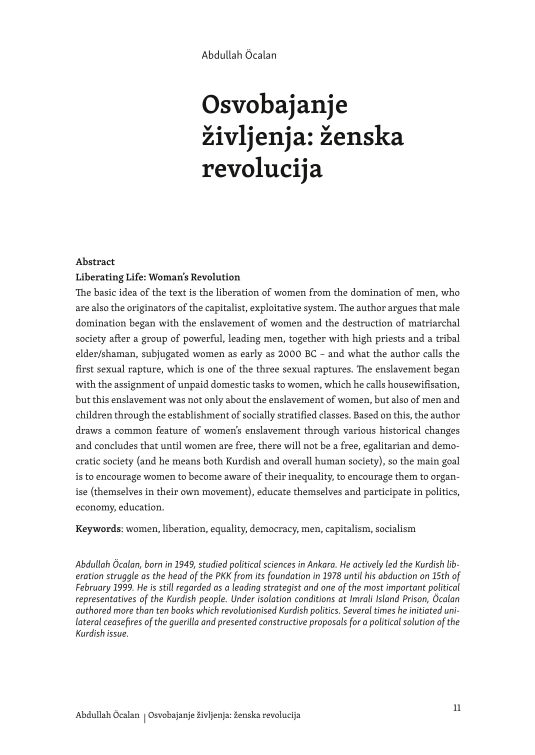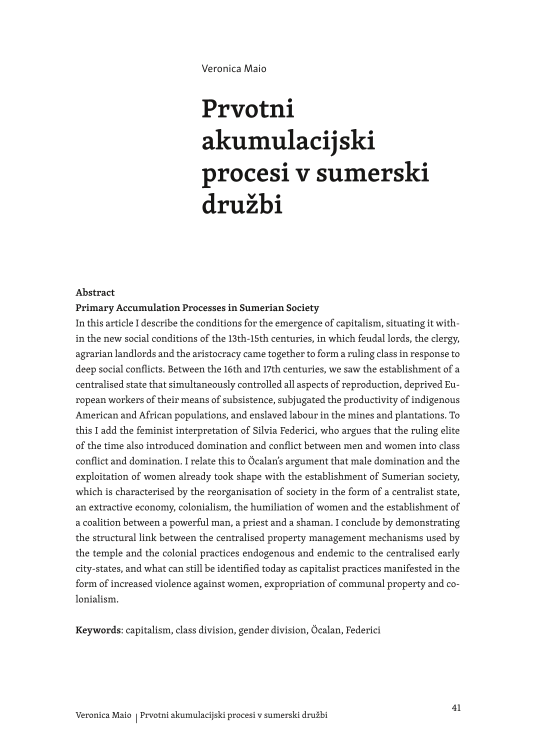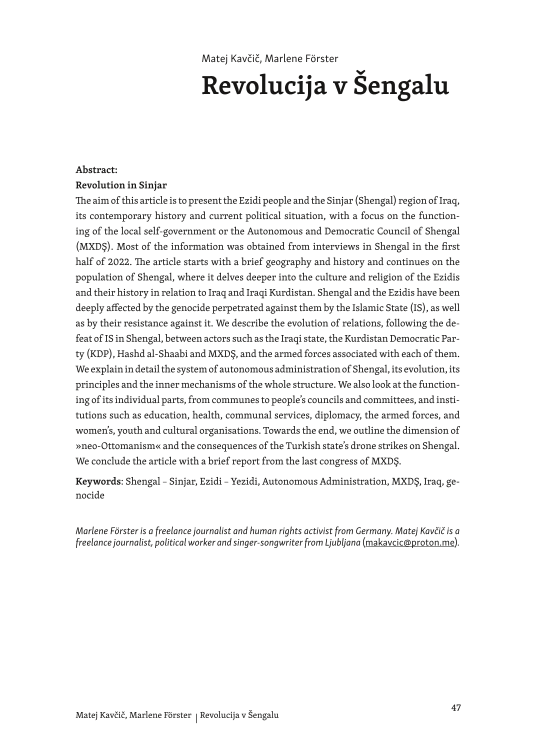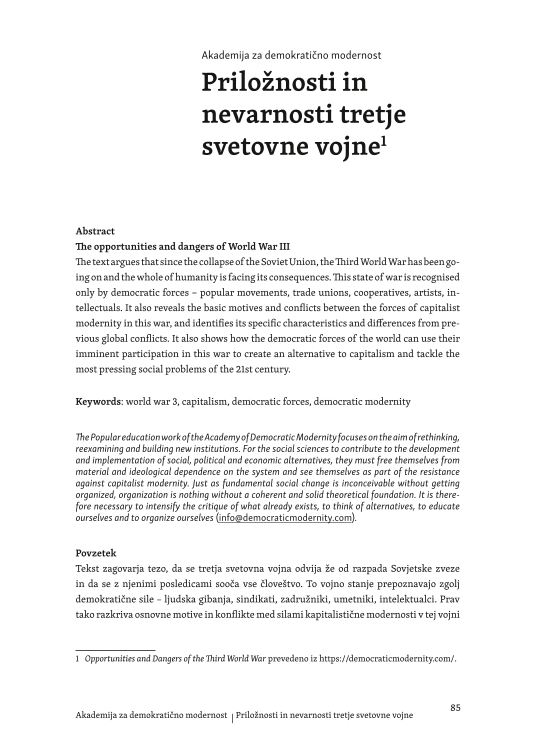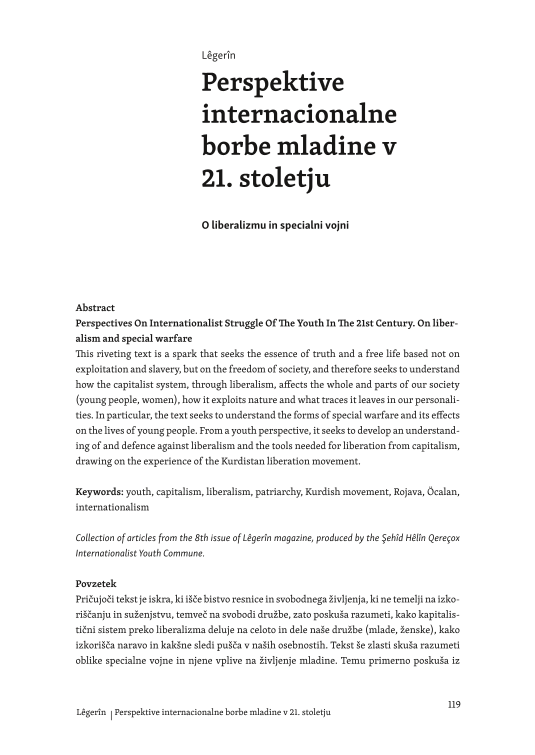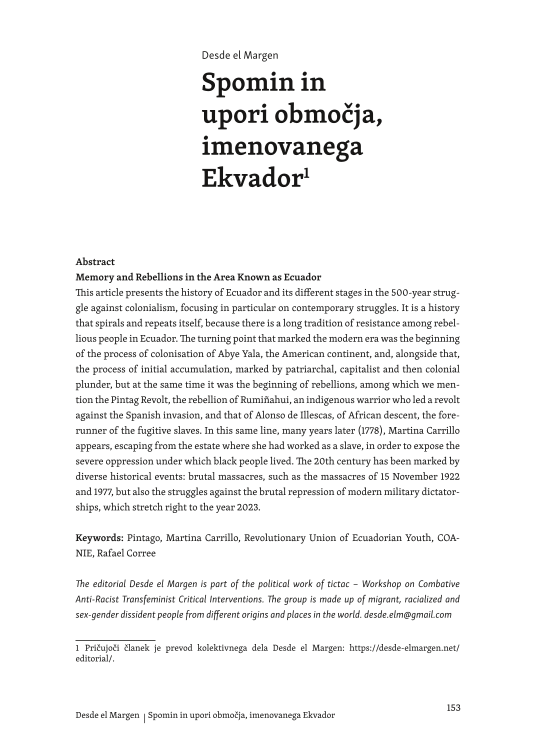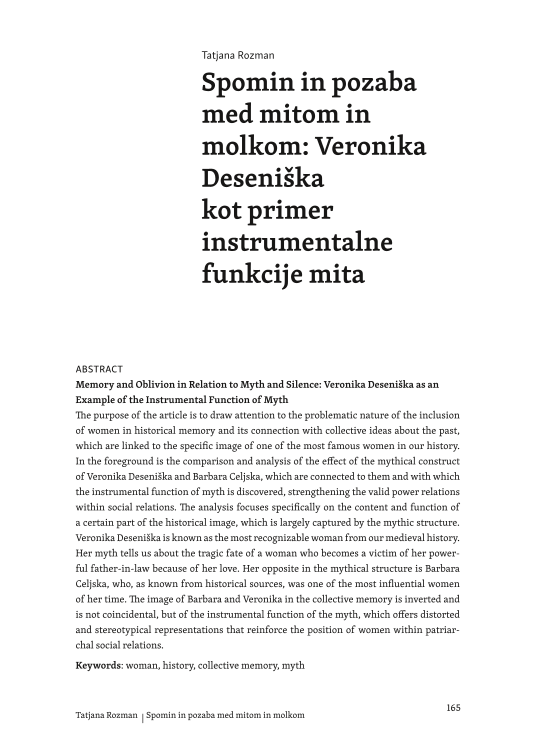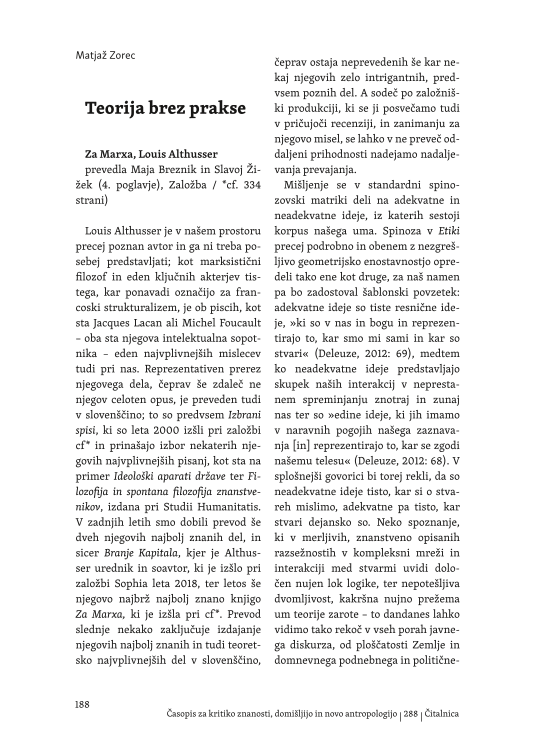Amargi is said to be the first known record of the word for freedom. In Sumerian it literally meant a return to the mother - a return to the old matriarchal values, to nature and freedom from slavery and debt. On the fertile crescent a central civilisation was established, and with it patriarchy, which brought class and the state. Today, on the same fertile soil and the surrounding mountains, the revolutionary movement for the freedom of Kurdistan is fighting the same - five thousand years old - social problems that we all face, including here in the Balkans.
In the tradition of the Journal for the Critique of Science, in this issue we continue our thematisation of the autonomy of social movements and their organisation to achieve liberation beyond the establishment of new state structures. Just as in last year's issue we focused on the Zapatista movement (which has just published communiqués on the self-abolition of the organs of popular power and the beginning of a complete reorganisation), this time we have taken up the Kurdish liberation movement and composed the issue with thematically diverse texts that, on the one hand, analyse the realities of capitalist modernity and, on the other, open up horizons of freedom.
The basic idea of the text is the liberation of women from the domination of men, who are also the originators of the capitalist, exploitative system. The author argues that male domination began with the enslavement of women and the destruction of matriarchal society after a group of powerful, leading men, together with high priests and a tribal elder/shaman, subjugated women as early as 2000 BC – and what the author calls the first sexual rapture, which is one of the three sexual raptures. The enslavement began with the assignment of unpaid domestic tasks to women, which he calls housewifisation, but this enslavement was not only about the enslavement of women, but also of men and children through the establishment of socially stratified classes. Based on this, the author draws a common feature of women’s enslavement through various historical changes and concludes that until women are free, there will not be a free, egalitarian and democratic society (and he means both Kurdish and overall human society), so the main goal is to encourage women to become aware of their inequality, to encourage them to organise (themselves in their own movement), educate themselves and participate in politics, economy, education.
In this article I describe the conditions for the emergence of capitalism, situating it within the new social conditions of the 13th-15th centuries, in which feudal lords, the clergy, agrarian landlords and the aristocracy came together to form a ruling class in response to deep social conflicts. Between the 16th and 17th centuries, we saw the establishment of a centralised state that simultaneously controlled all aspects of reproduction, deprived European workers of their means of subsistence, subjugated the productivity of indigenous American and African populations, and enslaved labour in the mines and plantations. To this I add the feminist interpretation of Silvia Federici, who argues that the ruling elite of the time also introduced domination and conflict between men and women into class conflict and domination. I relate this to Öcalan’s argument that male domination and the exploitation of women already took shape with the establishment of Sumerian society, which is characterised by the reorganisation of society in the form of a centralist state, an extractive economy, colonialism, the humiliation of women and the establishment of a coalition between a powerful man, a priest and a shaman. I conclude by demonstrating the structural link between the centralised property management mechanisms used by the temple and the colonial practices endogenous and endemic to the centralised early city-states, and what can still be identified today as capitalist practices manifested in the form of increased violence against women, expropriation of communal property and colonialism.
The aim of this article is to present the Ezidi people and the Sinjar (Shengal) region of Iraq, its contemporary history and current political situation, with a focus on the functioning of the local self-government or the Autonomous and Democratic Council of Shengal (MXDŞ). Most of the information was obtained from interviews in Shengal in the first half of 2022. The article starts with a brief geography and history and continues on the population of Shengal, where it delves deeper into the culture and religion of the Ezidis and their history in relation to Iraq and Iraqi Kurdistan. Shengal and the Ezidis have been deeply affected by the genocide perpetrated against them by the Islamic State (IS), as well as by their resistance against it. We describe the evolution of relations, following the defeat of IS in Shengal, between actors such as the Iraqi state, the Kurdistan Democratic Party (KDP), Hashd al-Shaabi and MXDŞ, and the armed forces associated with each of them. We explain in detail the system of autonomous administration of Shengal, its evolution, its principles and the inner mechanisms of the whole structure. We also look at the functioning of its individual parts, from communes to people’s councils and committees, and institutions such as education, health, communal services, diplomacy, the armed forces, and women’s, youth and cultural organisations. Towards the end, we outline the dimension of »neo-Ottomanism« and the consequences of the Turkish state’s drone strikes on Shengal. We conclude the article with a brief report from the last congress of MXDŞ.
The text argues that since the collapse of the Soviet Union, the Third World War has been going on and the whole of humanity is facing its consequences. This state of war is recognised only by democratic forces – popular movements, trade unions, cooperatives, artists, intellectuals. It also reveals the basic motives and conflicts between the forces of capitalist modernity in this war, and identifies its specific characteristics and differences from previous global conflicts. It also shows how the democratic forces of the world can use their imminent participation in this war to create an alternative to capitalism and tackle the most pressing social problems of the 21st century.
Perspectives On Internationalist Struggle Of The Youth In The 21st Century. On liberalism and special warfare
(
This riveting text is a spark that seeks the essence of truth and a free life based not on exploitation and slavery, but on the freedom of society, and therefore seeks to understand how the capitalist system, through liberalism, affects the whole and parts of our society (young people, women), how it exploits nature and what traces it leaves in our personalities. In particular, the text seeks to understand the forms of special warfare and its effects on the lives of young people. From a youth perspective, it seeks to develop an understanding of and defence against liberalism and the tools needed for liberation from capitalism, drawing on the experience of the Kurdistan liberation movement.
This article presents the history of Ecuador and its different stages in the 500-year struggle against colonialism, focusing in particular on contemporary struggles. It is a history that spirals and repeats itself, because there is a long tradition of resistance among rebellious people in Ecuador. The turning point that marked the modern era was the beginning of the process of colonisation of Abye Yala, the American continent, and, alongside that, the process of initial accumulation, marked by patriarchal, capitalist and then colonial plunder, but at the same time it was the beginning of rebellions, among which we mention the Pintag Revolt, the rebellion of Rumiñahui, an indigenous warrior who led a revolt against the Spanish invasion, and that of Alonso de Illescas, of African descent, the forerunner of the fugitive slaves. In this same line, many years later (1778), Martina Carrillo appears, escaping from the estate where she had worked as a slave, in order to expose the severe oppression under which black people lived. The 20th century has been marked by diverse historical events: brutal massacres, such as the massacres of 15 November 1922 and 1977, but also the struggles against the brutal repression of modern military dictatorships, which stretch right to the year 2023.
Memory and Oblivion in Relation to Myth and Silence: Veronika Deseniška as an Example of the Instrumental Function of Myth
(
The purpose of the article is to draw attention to the problematic nature of the inclusion of women in historical memory and its connection with collective ideas about the past, which are linked to the specific image of one of the most famous women in our history. In the foreground is the comparison and analysis of the effect of the mythical construct of Veronika Deseniška and Barbara Celjska, which are connected to them and with which the instrumental function of myth is discovered, strengthening the valid power relations within social relations. The analysis focuses specifically on the content and function of a certain part of the historical image, which is largely captured by the mythic structure. Veronika Deseniška is known as the most recognizable woman from our medieval history. Her myth tells us about the tragic fate of a woman who becomes a victim of her powerful father-in-law because of her love. Her opposite in the mythical structure is Barbara Celjska, who, as known from historical sources, was one of the most influential women of her time. The image of Barbara and Veronika in the collective memory is inverted and is not coincidental, but of the instrumental function of the myth, which offers distorted and stereotypical representations that reinforce the position of women within patriarchal social relations.
Za Marxa, Louis Althusser prevedla Maja Breznik in Slavoj Žižek (4. poglavje), Založba / *cf. 334 strani)
Louis Althusser je v našem prostoru precej poznan avtor in ga ni treba posebej predstavljati; kot marksistični filozof in eden ključnih akterjev tistega, kar ponavadi označijo za francoski strukturalizem, je ob piscih, kot sta Jacques Lacan ali Michel Foucault – oba sta njegova intelektualna sopotnika – eden najvplivnejših mislecev tudi pri nas. Reprezentativen prerez njegovega dela, čeprav še zdaleč ne njegov celoten opus, je preveden tudi v slovenščino; to so predvsem Izbrani spisi, ki so leta 2000 izšli pri založbi cf* in prinašajo izbor nekaterih njegovih najvplivnejših pisanj, kot sta na primer Ideološki aparati države ter Filozofija in spontana filozofija znanstvenikov, izdana pri Studii Humanitatis. V zadnjih letih smo dobili prevod še dveh njegovih najbolj znanih del, in sicer Branje Kapitala, kjer je Althusser urednik in soavtor, ki je izšlo pri založbi Sophia leta 2018, ter letos še njegovo najbrž najbolj znano knjigo Za Marxa, ki je izšla pri cf*. Prevod slednje nekako zaključuje izdajanje njegovih najbolj znanih in tudi teoretsko najvplivnejših del v slovenščino, čeprav ostaja neprevedenih še kar nekaj njegovih zelo intrigantnih, predvsem poznih del. A sodeč po založniški produkciji, ki se ji posvečamo tudi v pričujoči recenziji, in zanimanju za njegovo misel, se lahko v ne preveč oddaljeni prihodnosti nadejamo nadaljevanja prevajanja.




